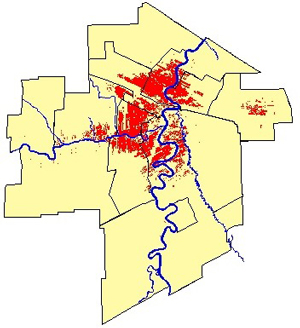Holiday season – View holiday hours for City of Winnipeg facilities and services from December 24 to January 1.
Lead in water
Lead is a common, natural metal found throughout the environment. Lead can be harmful if too much of it enters the body. Before experts knew it could be harmful, lead was used in many products, such as gasoline, paint, solder, pottery, crystal and plumbing hardware. It cannot be seen, tasted or smelled in drinking water.
Health Canada has updated the national guidelines for lead in drinking water to make drinking water even safer by decreasing the amount of allowable lead in drinking water to 0.005 mg/L or less.
Winnipeg's water continues to be safe to consume and meets established guidelines. The City of Winnipeg is offering free water quality testing to residents who may have lead water pipes through its lead water quality testing program.
The results of these tests can be found at winnipeg.ca/leadtestresults
Please note that the City of Winnipeg does NOT go door-to-door to offer water testing.
If you want more information on the effect of lead on your health, please:
- visit the Manitoba Government's Lead in Drinking Water page
- contact Health Links-Info Santé at 204-788-8200
Most homes within Winnipeg are not impacted by lead in drinking water because:
- Our water source has no detectable lead.
- The City of Winnipeg administers lead control programs including lead water quality testing, orthophosphate and lead pipe replacement.
- Approximately 87 percent of Winnipeg homes don't have lead water pipes.
Homes built before the mid-1950s may have lead pipes. (How to tell if you have lead pipes)
Some homes may have lead solder connections or water taps made out of brass and chrome-plated brass. Prior to 1989, lead solder was widely used to connect water pipes.
Concerned about lead in your water?

